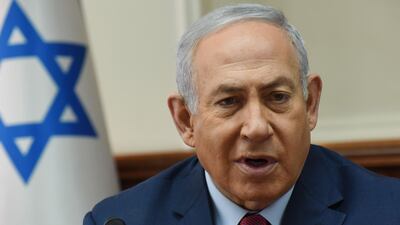Israel’s highly publicised discovery of an alleged cross-border tunnel built by Lebanon’s powerful Hezbollah group has been dismissed by many in Lebanon as a publicity stunt by Prime Minister Benjamin Netanyahu, who they say is trying to distract Israeli public opinion from domestic concerns, including accusations of bribery and fraud that have been brought against him by authorities.
Israel is considered an enemy state in Lebanon. Their troubled relationship harkens back to the founding of the Jewish State and has been punctuated by several Israeli invasions of Lebanon. The latest full-blown war was in the summer of 2006, triggered by Hezbollah’s kidnapping of Israeli soldiers.
Rumours that Hezbollah has dug tunnels beneath the Israeli frontier have made rounds in both Israeli and Lebanese media since the end of the month-long war in 2006.
Although the Israeli army has been searching for such tunnels along its northern frontier since at least 2014, Tuesday marked the first time authorities claim they have actually found one.
Whatever their political affiliations, most Lebanese newspapers questioned the timing and the motive behind the alleged discovery.
“It unburdens (…) Benjamin Netanyahu of the court cases that threaten him, and distracts public attention, once again, towards security threats," wrote the pro-Hezbollah newspaper Al Akhbar, referring to recommendations made by the Israeli police this week that Mr Netanyahu should be indicted for bribery and corruption.
Lebanon's anti-Hezbollah Daily Star newspaper said that “it is obvious that, as several reports from Tel Aviv indicate, the military operation is nothing but a PR stunt by Mr Netanyahu."
Timur Goksel, ex-UNIFIL (United Nations Interim Force in Lebanon) spokesperson between 1979 and 2003 and current Turkey editor for Al Monitor, said that a story about underground Hezbollah tunnels would be one way to distract public opinion.
"Stories like this are for local consumption. People get excited and tend to forget about other issues such as corruption," he told The National.
A total of three corruption cases have been brought against Mr Netanyahu this year. Last Sunday, the Israeli police recommended indictments on counts of bribery, breach of trust and fraud.
Authorities allege Mr Netanyahu, who claims he is innocent, awarded regulatory favours to Israel's leading telecommunications company, Bezeq Telecom Israel, in return for favourable coverage on a news website, Walla, owned by the company.
Netanyahu's conservative coalition government was also weakened mid-November when Defence Minister Avigdor Liberman resigned in protest at a Gaza ceasefire which he called a "capitulation to terror." Israeli opinion polls showed that most Israelis shared Mr Liberman's point of view, with only 17 per cent of respondents saying they were happy with Mr Netanyahu's policy towards Gaza.
Adopting a tough security approach towards one of Israel's main enemies, Hezbollah, would probably help boost Mr Netanyahu's popularity, especially with the next Israeli legislative elections coming up in late 2019.
But many analysts fear this strategy could dangerously escalate into a full-blown war.
In the past, other Israeli politicians have engaged in conflict while under investigation or facing internal pressure, says Mohanad Hage Ali, author of a book on Hezbollah. For example, former Israeli prime minister Ehud Olmert was under investigation when the 2006 war erupted against Hezbollah, he said.
"Israel is testing the waters and it's dangerous," he says. "In 2006, they said they could destroy Hezbollah within a few weeks, but that did not happen."
Hezbollah did not officially comment on Israel's latest operation but has recently increased its anti-Israeli rhetoric. Just last week, it issued a warning video with satellite images and map locations of Israeli sites with a message: "Attack and you will regret it."
Samir Hassan, a political analyst close to Hezbollah, told The National that "the possibility of a war is increasing" for several reasons. In addition to Netanyahu's domestic concerns, both Israel and US influence in the region is on the wane while the influence of Syria, as well as its ally Russia, is growing stronger, he said.
Should a war break out, Hezbollah has increased its capacity to inflict damage on Israel, says Mr Hage Ali. "They can surpass Israel's Iron Dome by increasing the number of rockets, and while Iron Dome can predict the trajectory, they cannot tell which ones are precision rockets or not," he said.
The actual number of Hezbollah's precision rockets is a closely guarded secret.
Israeli analysts interviewed by The Times of Israel have warned the destruction of Hezbollah's tunnel is just a "precursor to a larger Israeli operation" to remove the threat posed by precision missiles.
"Material necessary to build precision weapons is being smuggled on flights between Tehran and Beirut, rather than overland through Syria," Israeli newspaper Haaretz quoted Military Intelligence chief Amos Yadlin as saying on a local radio station last week. "The Iranians (who back Hezbollah) have changed their tactics. They're moving everything to Lebanon," he said.
However, other analysts have dismissed the possibility of war altogether, arguing that the risk is too high for both parties.
According to Mr Goksel, "the minute Israel attacks Hezbollah's missile forces, there's a war. And neither party wants one. War would be a very costly affair as both are better armed than back in 2006."


